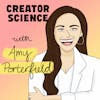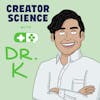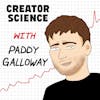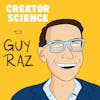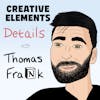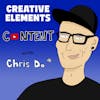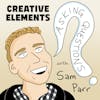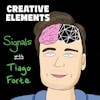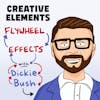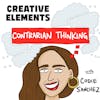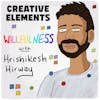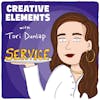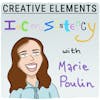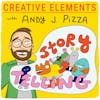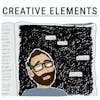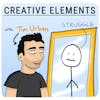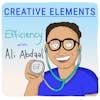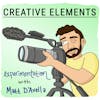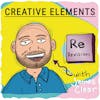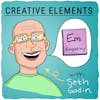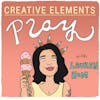
#80: Lauren Hom – How turning your work into play turns into my clients and more opportunities
Play EpisodeLauren is known for her bright color palettes and playful letterforms. She has created work for clients like Starbucks, Google, AT&T, YouTube and TIME Magazine. Her work has been recognized by Communication Arts, the Type Directors Club, and the Webby Awards.
Lauren Hom is a designer and hand lettering artist based in Detroit (formerly New York & Los Angeles).
Lauren is known for her bright color palettes and playful letterforms. She has created work for clients like Starbucks, Google, AT&T, YouTube and TIME Magazine. Her work has been recognized by Communication Arts, the Type Directors Club, and the Webby Awards.
Lauren is also the author of the popular blog and book Daily Dishonesty. She finds that she's happiest when creating; so, when she's not working, you can find her baking yummy things, selling your ex-boyfriend's tears, or putting bread on her head.
In this episode, we talk about Lauren’s experience getting (and leaving) her dream job, what she took away from her time at an ad agency, how she grew her Instagram account to 250,000 followers, and why her instinct to bring play into her work has helped her find new clients and new opportunity.
Follow Lauren Hom on Instagram
Full transcript and show notes
***
IF YOU LOVE CREATIVE ELEMENTS
Follow Creative Elements on Instagram
Subscribe to weekly episode emails
Leave a review on Apple Podcasts
***
ABOUT JAY CLOUSE
Subscribe to my newsletter, Creative Companion
***
SPONSORS
Get a free 45-day extended trial of Canva Pro
Get a free month of Blinkist Premium
Get 50% off your first three months of Sendinblue's premium account with promo code CREATIVE
***
FOR PODCASTERS
Enroll in my podcasting workshop
Enroll in my course on podcasting, Podcast Like The Pros
***
PODGLOMERATE NETWORK
This show is a part of the Podglomerate network, a company that produces, distributes, and monetizes podcasts. We encourage you to visit the website and sign up for our newsletter for more information about our shows, launches, and events. For more information on how The Podglomerate treats data, please see our Privacy Policy.
Since you're listening to Creative Elements, we'd like to suggest you also try other Podglomerate shows surrounding entrepreneurship, business, and careers like Rocketship.fm and Freelance to Founder.
Learn more about your ad choices. Visit megaphone.fm/adchoices
Lauren Hom 00:00
I think oftentimes when we think about making a jump and I'm still guilty of this, it's like very binary, it's like I'm going to succeed or I'm going to fail. And there's no in between initially in our minds but there's so much in between.
Jay Clouse 00:15
Welcome to Creative Elements, a show where we talk to your favorite creators and learn what it takes to make a living from your art and creativity. I'm your host, Jay Clouse. Let's start the show. Hello, welcome back to another episode of Creative Elements. Man, I've gotten such incredible feedback from my recent episodes of the show. So thank you for listening along and thank you for sharing the show. Thank you for supporting me, whenever I see someone sharing the show on social media, it just absolutely makes my day, whether it's just a screenshot on your story or a thread on Twitter or anything else, it means a whole lot so thank you, thank you, thank you. And as long as you tag me and I see it, I'll be sure to share it on my profile as well. Last month, as you may recall, I ran a listener survey for the show and I was really surprised to find out that the majority of listeners of the show are most active on Instagram as opposed to any other social media platform. And so it inspired me to start a dedicated Creative Elements account on Instagram. It's just getting started but it's a priority for me to make this a worthwhile addition to your listening experience for this show. So please take a moment and follow creativeelements.fm on Instagram is the first link in the show notes. So if you're on Instagram, please give it a follow. It only takes about 30 seconds to go to the shownotes, click the link, follow creativeelements.fm on Instagram. I know you know how important it is to get initial followers and every follow counts. I see every one of you, I creep on your profile, I say hello so go to Instagram and follow creativeelements.fm. Speaking of Instagram, I could be doing a better job of showcasing the stories of more visual creators. So this week, I'm speaking with Lauren Hom, a designer and hand lettering artist based in Detroit, formerly New York in Los Angeles. You can find her on Instagram @homsweethom, where she has 250,000 followers. In fact, if you are still on Instagram from following creativeelements.fm, I recommend you take a second to look at her account @homsweethom, that's homsweethom. Lauren is known for her bright color palettes and playful letter forms, she has created works for clients like Starbucks, Google, AT&T, YouTube, and Time Magazine. Her work has been recognized by Communication Arts, The Type Directors Club, and the Webby Awards. And she had a quick start to her career getting her dream job right out of college.
Lauren Hom 03:00
I went to the School of Visual Arts and got a BFA in Creative Advertising and I had this four year plan. I was going to go to school, get an ad degree and go get a job as an art director, junior art director at an agency in New York and that's exactly what happened. I was working at BBDO New York, which is like a pretty classic New York City ad agency big network. My partner and I got hired together right out of school, it was basically our dream job. And within six months, I became disillusioned and started to realize that ooh, the long hours and the kind of sporadic work schedule where we would like play ping pong until 3pm, and then get briefed at 4pm and stay until 9 or 10. It wasn't quite working for me and I started having all these questions of, oh shoot my four year plan. Maybe the results aren't exactly what I wanted.
Jay Clouse 03:55
Lauren eventually left that ad agency to start freelancing on her own. And along the way, she was leaning into some ideas she had for fun, quirky personal projects, things like flour crowns, spelled F L O U R an edible art project where she made crowns out of food, you'll get a taste of that project from this week's episode artwork. She also created a line of flasks labeled Ex Boyfriend Tears in another project that led to a book deal.
Lauren Hom 04:22
In college, I had started a Tumblr blog called Daily Dishonesty where I was lettering little white lies that my girl friends and I would tell ourselves and that had caught a good wave of internet as I like to say, and I had gotten a $25,000 book deal from that when I graduated college so I had a chunk of change put away too.
Jay Clouse 04:42
So in this episode, we talk about Lauren's experience, getting and then leaving her dream job. What she took away from her time at that ad agency, how she grew her Instagram account, and why her instinct to bring play into her work has helped her find new clients and new opportunity. I'd love to hear your thoughts on this episode, as you listen, you can find me on Twitter or Instagram @jayclouse tag me, let me know that you're listening. I'll reshare it on my account as well and now, let's talk with Lauren.
Lauren Hom 05:17
So I was working in ad and once I became dissatisfied and realized that, hey, I'm only 23 years old, this is my first job. I was like, well, I could try freelancing full time, I'm not quite sure if I can do it. I'm lucky that I have a safety net, like in the US, for anyone who's listening outside of the US, you can stay on your parents health insurance until you're 26. And I was like, okay, well, I can take this leap. And when I had the realization that getting a full time job at 23 or 24, the difference between that if worst case scenario, freelancing didn't work out, and I had to go back to the ad industry, I still had my degree, my portfolio, and I was like, oh, the difference is negligible. I'm going to just take this leap and here I am, eight years later, still in the leap.
Jay Clouse 06:07
What did it feel like when you were starting to realize that maybe this job wasn't what I expected to be? How big of a like letdown was that, versus like, oh, I guess I was wrong, because you've been working towards that for years and you had gotten it.
Lauren Hom 06:20
It was a journey. It wasn't as I wish, I wish I could have been chill about it. I was totally not I have a specific memory actually. It's funny, we're talking in October, because my girlfriends and I, who were also in the design ad industry, had gone to some event and just got an absolutely blasted off of free drinks at this event. It was the first time I think with that liquid courage. It was the first time I ever told somebody that I didn't like my job. And that was huge, and I broke down in tears, and it was a whole thing because you know, as Brene Brown would say things, things tend to get worse when you're in secrecy. There's a lot of shame around and actually, that's exactly what I felt, I felt shame that here I was with my dream job. And so many other people would have wanted this job, the environment that I was raised in an ad school was like, jobs are scarce, like everyone's vying for the same spots, and like, you should be grateful to have a job. And so I went through this whole identity crisis, especially like he said, after having gone through my four year plan with a very specific outcome, I got the outcome I wanted. And I just was like, whoa, did I just waste the last four years? And the answer in hindsight is no, you never waste anything. It all comes together and serves you in the future and I'm sure we'll talk about that later. But I was really distraught, because there was the whole process of coming to terms with it on my own, telling somebody else about it, and starting to have conversations with friends and family really helped. And then getting to that point of taking action where I was like, okay, I'm actually going to quit, let's do this, there was a whole journey and it wasn't pleasant. But I finally got to the point when I realized that I was the only variable really left to change in the equation of my life job situation. I didn't think that going to another ad agency was going to be the thing. I actually had a conversation with a mentor of mine, who was the impetus for me putting in my two week notice. I had been at the agency for nine months so when I said, you know, six months after being realizing I wasn't happy at the job, I still stayed I, it's so easy to convince ourselves to stay in things that we know aren't really aligned. But all practical benefits on paper. Yeah, just one more month, just you know, a couple more months, you know, I'll grow into it, you know, climb your way up the ladder, there was that kind of mentality that, okay, it's not going to be all sunshine and rainbows at the beginning, but it still didn't feel any better knowing that. And I had been at the agency for nine months after convincing myself to stay for a little longer. And I had this plan in my head, probably just based on the conventional advice I had gotten in terms of career that I was going to stay for a year because it would look better on a resume. I don't know if that's the case anymore. I definitely don't have a resume now.
Jay Clouse 08:34
Just one more month.
Lauren Hom 08:45
We all believe that, we always think like the year mark is this magical difference that matters on this piece of paper that no one really looks at that closely. Totally and so I had that year mark in my head. I was like, I can tough it out for another three months. And I grabbed coffee with my friend and mentor Justin Gignac, who's the founder, co founder of Working Not Working, the freelancer site. And I told him my plan and he had previously left advertising to to pursue his own thing. And so I was just looking to him for guidance. And he said something so matter of factly, he said, well, if you know you don't want to work in advertising anymore, why does the year matter on your advertising resume? And I was like, ooh, lightbulb moment. He's totally right. He got me with the logic. And so for some context to I had been dabbling in freelance on the side since sophomore year of college, I started picking up gigs on Craigslist designing people's wedding invitations and just any little bits I could get. And so I had built up, I wouldn't say a steady stream of freelance work, but bits and pieces here and there, design, illustration, lettering, just trying different things out. So it wasn't like I was jumping into nothing. I did have kind of a hobbled together plan B.
Jay Clouse 10:26
And you said you were living in New York at this time, right?
Lauren Hom 10:28
I was, yes.
Jay Clouse 10:30
Because that's the thing that if I'm putting myself in your shoes would have probably scared me the most about going full time freelance is New York is an expensive city to be paying your bills with freelance work. And it must, I mean, if you were already working some clients you had gotten comfortable with selling, which is nice. But did you have any anxiety around that?
Lauren Hom 10:51
Oh, yeah, absolutely. Yes, you're right, New York City is very expensive. And I thought through all the different practical things like that would have to happen in order for like my quote unquote, worst fears to be realized, like homeless on the streets. And I think oftentimes, when we think about making a jump, and I'm still guilty of this, it's like, very binary, it's like, I'm going to succeed or I'm going to fail. And there's no in between, initially, in our minds, but there's so much in between, as most of us know, in hindsight. And so when I thought about it, I was like, okay, what's actually going to practically have to happen? What are these different layers? And when I broke it down, it actually wasn't that scary. It was, you know, I had been freelancing on the side saving up money. So that's, I think, important context for anyone listening to this.
Jay Clouse 11:41
When you wanted to leave the job, when you realize that I'm not happy here, was it that the job was lacking something or that it was putting too much on you of stuff that you didn't like? Like, what was the disconnect?
Lauren Hom 11:53
I think it was a bit of both. So one thing I've realized over the years, that is deeply satisfying to me and I need from any work that I do is I love overseeing the creative process and seeing things ship. And I think what really put a wrench in that, for me with advertising at least was, we'd work all these late nights, we would put in all this effort, and ideas would get killed halfway through at the beginning. And I think six months into the job, my ad partner and I went to our ECD. And we're like, hey, are we gonna get fired? Are we doing okay? Because we haven't sold through a single thing. And he was like, no, it's just the industry, like, don't worry about it, you're doing great. And there is just a deep sense of dissatisfaction of putting in all this hard work and seeing nothing from it. And I didn't really feel like I was making any impact. I was paying the bills that felt good. I think that was kind of like level one of I went into advertising in the first place, because it seemed like this perfect mix of practical and creative, like you can make a solid living because it's marketing and brands are always marketing, but it's also creative. And so I think it was just that dissatisfaction that really got to me, and then the lack of, I guess seeming autonomy over my life, I would have to I would make dinner plans at seven or something after work, and end up canceling them 90% of the time, because work took priority. And the schedule was so sporadic, and I just didn't feel like the juice was worth the squeeze, I suppose. I'm totally fine with working hard. And I really believe that most creative people are willing to put in so much effort and work so hard for things they believe in and things they're passionate about. But that's a prerequisite for me. And so I just started feeling like, Okay, this is only the first year of this job. And a career is supposed to be supposed to be like 30 years. I don't know if that's what I want for myself. And I'm sure I could have sucked it up and done it. But I think I got to a point where I realized I would regret not giving it a shot. I'm going out on my own so yeah, I think that was the impetus for me, finally leaving the job.
Jay Clouse 14:14
After a quick break, Lauren and I talked about the things she learned from her time working at the ad agency. And later we talked about how a passion project led to a book deal that Daily Dishonesty blog she was talking about, how she grew a following on Instagram, and more. So stick around, and we'll be right back. Welcome back to my conversation with Lauren Hom. Before the break, Lauren and I were talking about the decision to leave her job at an ad agency. We've all left jobs that we didn't like but there are things that we take away from every opportunity no matter how much we did or didn't enjoy it. So I asked Lauren, what she learned from the ad job that sticks with her today.
Lauren Hom 14:51
Ooh, well, it's like I said earlier, I felt like the four years I had spent at school was going to be a complete waste. But of course it wasn't I basically got to take all of my advertising skills and you know, briefs that I had read and learning how to kind of figure out a creative execution based on a set of desired results. And instead of advertising for other brands and products, that I didn't really at the end of the day care much about, like, cool, I can sell more Sharpie markers but you know, it's not my life's mission. And I took all those and realized I could apply them to myself and my freelance business and lettering, which is what I had been doing primarily on the side as with freelance as I got closer to leaving my job so I think I took that away. And then from a practical sense, as I went into commercial lettering and illustration, having an agency background, and now working with agencies on the other side as the hired creative talent, I think was very helpful to know that, like, I understand schedules can be all over the place. I'm fine working fast on quick deadlines. And that from a practical sense, has served me really well.
Jay Clouse 16:02
Yeah, these are all things that I imagined, like, I wish, I wish you could and maybe you do in your courses, like package this and share it with some freelancers, because like selling yourself, marking yourself, being able to come in and be easy to work with on tight deadlines, knowing how to communicate with big name brand clients, like all that stuff is so scary and unknown when you haven't had the experience. And it's probably really nice to have experienced that in kind of a safe but frustrating sounding way at the, at the agency.
Lauren Hom 16:31
Yeah, absolutely. I actually, I can tell you a story from like my agency days that also probably contributed to me, sparking an interest in leaving and trying to pursue commercial illustration and lettering is, I won't say client names or designer names, because I don't know if that's confidential. Art Director at the agency was working with an illustrator on an ad campaign for a big client. And I remember them casually disclosing to me how much they were paying that Illustrator for that ad campaign, which was going to be like a 360 campaign with print ads, and digital and all this stuff so the works in terms of usage. And I think the project fee was something like $40,000. And I was like, that's like almost my salary, that's wild.
Jay Clouse 17:17
Yeah.
Lauren Hom 17:18
And of course, anyone who's been in like the commercial creative arts knows that those jobs aren't the norm there. I wouldn't say far and few between, but they're definitely not the norm. I think my average project fee is probably around like $5,000 or $6,000, maybe maybe higher, depending on the type of projects I'm taking that year but I remember hearing that. And that's why I think it's, it can be scary, but I really appreciate. I tried to do it but it's it's scary, being transparent. It can be tough to do in a public forum because everyone's got an opinion, but especially with my students, sharing numbers, like honest numbers, honest experiences, what this is really like, I think I learned I've learned so much from people doing that. And so I try to do the same because you don't know what you don't know. And once I found that out, I was like, well, if I can just book one of those jobs a year, that makes me feel pretty confident. And for more context to when I left my job. The biggest clients I had worked with on a freelance lettering basis were YouTube, Italy, and the Dallas Fort Worth airport.
Jay Clouse 18:29
Very different clients.
Lauren Hom 18:30
Very different clients and I remember yeah, the I think the highest project fee I had negotiated on my own, which I was so terrified to put the bid in and didn't know what I was doing and probably severely underbid but I think it was like $5,500. And I was so nervous but I got the job. And at the same time, I was getting ready to leave the agency I had also,I had basically been planting seeds. Once I realized, I think I need to make an exit plan. So I've been planting seeds for, I don't know, four or five months, and I was reaching out to illustration agents, and I happened to get an answer back, I think I sent out like 30, I got a couple answers and ended up chatting with a few and signed on with one of them, right as I was leaving my job. So it was this kind of perfect coalescence of all these experiences and things coming together. And my jump into freelance was not that big of a jump because I had been planting seeds for a while even before I was dissatisfied with my job with the blog and the book deal and all that stuff.
Jay Clouse 19:35
Yeah, I think that's the way to do it. I wish more people would go that direction as opposed to kind of like jumping without a parachute because when you go to your employer and say, hey, I need to make a transition, they panic. They're like, no, I don't have time to hire somebody in the next two weeks and when you say but I'm willing to stay here for x number of months, that makes them so happy. A lot of people go full time freelance in their first client is the employer to like,
Lauren Hom 20:01
Yes.
Jay Clouse 20:01
some amount of time.
Lauren Hom 20:03
You're so right and I think that's so important to share because I had that exact same fear that question you asked me earlier of how I was feeling about making the transition, I was terrified. And I had this story in my head, that once I tell my ECD, tell my ad partner that I'm leaving advertising, I'm going to be like blacklisted from the industry. No one's gonna want to work with me, people are gonna think, oh, who does she think she is? She only she got this job and she left after less than a year like, and I had all these stories in my mind, and none of them came true. And I've yeah, in the year, in the year after I first quit my job. I think I worked with my ECD twice on projects, because, listen, there's a practical element to creative agencies. They need talent, they need certain things, they need illustrations, headlines, whatnot. And if they know you've got the skill set and you have a relationship already bridges already there.
Jay Clouse 20:59
Yeah and that's probably a tight deadline, they're gonna go with like, the shortest distance to getting somebody in that can do it.
Lauren Hom 21:05
Totally.
Jay Clouse 21:05
They know that they trust. And if you're going if you're going full time independent, it's not like you have pressure from another job saying you got to start in two weeks. So that slow transition, I think, is something people under utilize.
Lauren Hom 21:17
Absolutely, yes.
Jay Clouse 21:20
Earlier in the conversation, Lauren touched on the book deal that she got right out of college. Getting a book deal at age 21 is a pretty incredible feat. Especially for someone who wasn't trying to build a life as an author and Lauren wasn't trying to become an author, she was just playing.
Lauren Hom 21:36
Yeah, 2012 I was entering my senior year of college and I got really drunk with my roommate one night, and we were talking about all the things we were going to do senior year, like all the hobbies we were going to take on and I had a plan to go to hot yoga every day, which seems like a very distant memory, it didn't happen. Anyways, all of our big plans, we ended up laughing at how grand our plans were because we knew we weren't going to have any time to do anything because it was senior year and portfolios and applying for jobs and that sparked an idea. I mean, I was like, oh, my girl friends and I when we're just hanging out, tell each other these little like innocent white lies all the time. And I had just gotten into hand lettering around that same time. I thought it was really nice because it was kind of the antithesis of what my brain was doing with my like creative advertising program where the idea of slowing down to draw words letter by letter was just really meditative for me and I got really into it. And of course, I think with like design blog, internet culture around 2012, you know, there were people like Jessica Hische and Dan Passarro and Dana Tanamachi, like making the rounds on the Internet and lettering was like becoming a thing. And I was on board and yeah, I went to my room and decided I was going to draw some of them out. And it really happened quickly because I didn't put any pressure on the project. I was like, this is going to be a fun thing. And I can, it'll give me a brief or like a reason to practice the thing that I want to do. And probably like subconsciously, my ad copywriting campaign skills were working behind the scenes, and I called it Daily Dishonesty, I find alliteration very pleasing and it is catchy too. And I just threw it up on a Tumblr blog and posted it to my personal Facebook and shared it with my friends. And it just kind of went from there.
Jay Clouse 23:39
What are some of the lines from this project that stick out to you?
Lauren Hom 23:43
Yeah, so keep in mind, wow, we were all 21 at the time and they were really frivolous silly things. But things that honestly came up in conversations with friends things like, I'll be there in five minutes when you haven't left the apartment actually, or, you know, I'll do the dishes tomorrow, just little little life things that really weren't anything groundbreaking. Definitely first world problems but just wore what my friends and I were talking about at the time and it caught this wave of internet. I think I use some hashtags on Tumblr, but there was really no big plan to like, get it out there. And this was probably at the height of Tumblr as well so I acknowledged that but it it caught on like the trending typography hashtag on tumblr and just started circulating and I had designers reaching out to me being like, hey, this is awesome, I want to contribute. And it just grew organically from there and a literary agent reached out to me a couple months later and it just it caught on and maybe I'm lucky that my first you know, personal project caught that wave of Internet but it was it was really a whirlwind and it was also really exciting and validating of like, oh, people like this idea or they like the lettering, maybe a little bit of both, and it encouraged me to continue to practice that. And once the audience started trickling in, it gave me more incentive to like, oh, I don't want to let them down. So I, I kept posting, and yeah, eventually got a book deal for it. And it became this whole thing that basically launched my freelance lettering career before I even knew I wanted it.
Jay Clouse 25:23
Crazy.
Lauren Hom 25:24
Yeah, it was really wild.
Jay Clouse 25:26
Before the book deal happened, what types of expectations did you put on yourself and that project? Was something where it's like, I'm going to post every day and did it ever feel stressful?
Lauren Hom 25:36
You know, it didn't, because I put no expectations on it. And I will say this, I think I really benefited from that being my first project and like the naivete that comes with, oh, I just made a thing, I'm just going to throw it out there and see what happens. Whereas now, it's different now, you know, 10, 9 years later, when I launched projects, because I know the power of passion projects. I'd be lying if I said I wasn't more calculated and like had more expectations for these now. But there, I always tell people, it's, it's my favorite project. And that was probably one of my favorite kind of seasons of my creative career because I didn't know what I was doing and I put no pressure on it, and the beauty of the project, too, was it was called Daily Dishonesty. And so by not posting every day, I was staying true to what the blog was, it just was kind of a happy accident. And I just, I worked on it between classes and I had a part time job too. And so I didn't have a ton of time to work on this but I also wasn't putting any expectations on the quality of the lettering or the work because I was a novice letterer. And the best I could do like that was the best I could do. I didn't have this bar, like I wasn't going to be Jessica Hische overnight. I knew I wasn't going to reach that level of refinement in my skill and so I just let it be what it was. And I drew some kind of wonky script and some sans serif type, because that was the easiest for me at the time. And lo and behold, it's still kind of what I'm known for today. I really look back fondly on that era because I think it was the the time in my life, I was the most creatively free and playful and just really enjoying pure creativity for creativity sake with no specific agenda or outcome I was like secretly hoping for.
Jay Clouse 27:32
Isn't that conflicting? It feels conflicting to me all the time when it's like, I have so much expectation and I put so much thought into doing things right in a way that like, oh, I could I can see how this would succeed if it does. Whereas a lot of times, it's it seems like a lot of the magic happens when there's none of that. But how can you just like, intentionally have none of that? When we come back, Lauren and I talk more about the tension of trying to maintain low expectations after finding some success. And later, we talk about her experience building her Instagram following to 250,000 people right after this. Hey, welcome back. Just before the break, Lauren and I were talking about the magic that comes from having no expectations for a project. But when you've had a taste of success, or when some project has gotten some good feedback, it's so hard not to have expectations, especially as you get busier with more opportunity, you have to be more disciplined in how you prioritize your time. So I want to just dive a little bit deeper into that.
Lauren Hom 28:41
Yeah, once you've, you know, been down the block a couple times, it's, I think it's impossible not to have expectations, I think, you know, I've probably shared stuff like this before, too. But you'll see kind of nice sentiments going around Instagram being like, engagement doesn't matter, like all that matters is that you're happy with the project or the piece. And like, I wish that was 100% true but when we share something on Instagram or any social media platform, it's impossible not to kind of have some hopes for the post or if you spent a lot of time on something or you really feel like this is one of your better pieces. I mean, I certainly think like I know when I post like which ones I kind of hope do better or think will do better. And it's kind of anyone's guess at this point but that is kind of the paradox of advancing in your creative career. And I don't think there is a way to get that back. I look back fondly on that time of just like I'm going to make this thing for fun. And I still make plenty of things for fun but now that I have like a full fledged business and an online presence and like I definitely feel like sometimes there are expectations now with a larger audience of like people expect a certain type of work from me or a certain thing from me and I want to deliver on that but also like tap into that play and like experimentation as well. So I think for any creative person who is trying to be creatively free and explore, but also run a business, you kind of oscillate between those two camps or find that balance. And I've just had to be okay with certain seasons are more business oriented and some are more play oriented. And it doesn't have to be a 50/50 balance of both, because I've definitely gotten into places in my mind to where I'm like, I need a balance and I'm off balance right now so I must be doing something wrong. And the answer is no, there's just different times for different things. I see a lot of discourse online, which I think is good now about hustle culture, burnout, right, like not working so hard. And I 100% support that, because I think it's a reaction to just where we were 5, 10 years ago, culturally with work. But at the same time, I acknowledge, I wouldn't have the career I had I have right now, if I hadn't worked on my passion projects in between jobs and freelance, all throughout school, and also my first time job, and like, I went through a couple years of pretty intense, you know, laser focus on work, work, work. And I don't regret it, it definitely wasn't the healthiest, wasn't sustainable, but it's a part of my journey.
Jay Clouse 31:18
I struggle with that, too. Man, there's so much here. Like one thing that I also wanted to point out for people listening is like, you can't control timing. And sometimes things hit because of timing and it's not your control. And your input was what needed to be at that timing but like, you can control the timing, sometimes things happen, and you just can't predict it. But also, yeah, I hear what you're saying about just hard work generally, too. It's really hard, especially when other people are looking to you like, hey, help me get to where you are. It's hard to be like, well, there are periods of my life where I was just like, run ragged and you're going to have to be okay with that. Like, no one wants to hear that, no one wants to say it either. And you want it to not be true but man, everyone, I will say almost everyone I've talked to has had some similar story to that, where it's like, there's this period of time where I just worked really hard.
Lauren Hom 32:06
Absolutely and it really like, I think most of us know this but I always need the reminder to myself of like, taking every you know, interview I hear on a podcast or blog posts that I read. Everyone's I take everyone else's story with a grain of salt because their experience isn't mine, I can't replicate those situations. There's luck involved, there's, you know, access to resources involved this whole, you know, soup of things that come together to make someone's career or give them their big break. But I can give you a snapshot of yeah, when I first quit my full time job to go freelance. I'm very risk averse, actually, I love to explore and I like to take small risks. But I, I say I was raised by pretty practical parents, they would, I think they would, they wouldn't be mad at me for telling for saying that like they self identify as like squares. They're just very practical people and I don't blame them. And they just wanted me to be safe and to be able to provide for myself. But I actually lined up a part time job as a dog walker, when I first went freelance because I wasn't sure I could pay the bills with freelance. I had savings of course, but I just wanted to be extra sure I had money coming in no matter what. And so a month after quitting my job here I am, three dogs in hand in the lobby of someone's apartment building taking a client call with my agent and that was my life for the first six months of freelancing eventually, like again, taking off the training wheels, baby steps, I quit the dog walking job because I was like, okay, I'm getting into a groove, I'm feeling more comfortable going to take the training wheels off. And it was just little baby step after baby step, building confidence, learning from experiences and just kind of piecing together a career that there really wasn't too much of a roadmap for. I think that maybe things have changed now but my my school and most colleges are really good at preparing people for full time employment, but not self employment. So it's just like, I learned so much by even just taking random Craigslist gigs on the side in college, just learning how to manage a business and send emails and deliver files that's that's the best education is just getting some experience it as imperfect as it may be.
Jay Clouse 34:35
Man, I really want to go down the path of the book and a literary agent but I have too much I want to talk about.
Lauren Hom 34:43
It's not even that interesting. If anybody wants to hear more about it, the actual nitty gritty of it is pretty boring. The book came out, I did some press for it, it sold okay. I will say this, it wasn't life changing in the sense that like, I think from the outside looking in, I thought a book deal would be, I do think the two biggest benefits were the clout or like the little career boost or credibility that comes with being a published author and like seeing your book in a store. And then also, of course, the advance that I got in the money for a 22 year old, that's like a million dollars. And so that those two things, I think were the primary things that launched my career that early, but everything else was just, I don't know, kind of kind of boring. And I never, it was never a dream of mine to be an author. And so that's one thing I will add, as well as like, it was like, oh, cool, this happened but it was very much just a stepping stone to get further into my freelance career, I would say.
Jay Clouse 35:45
How many years did it take to like, make and publish the book?
Lauren Hom 35:49
It took from signing ooh, from the initial reach out, the literary agent reached out to me on my 21st birthday, I want to say so that was kind of a nice thing to do this thing. And from that, to putting together a proposal, to signing a contract, to producing the book was probably a year and a half.
Jay Clouse 36:12
Well, today, you're still doing client work with some massive clients, but you also have digital courses, you have a very vibrant social media presence. We were talking about Tumblr or talking about Daily Dishonesty. When did Instagram enter the picture and how did how did that grow?
Lauren Hom 36:30
Instagram entered the picture in, I think 2013. So I didn't get an Instagram until after I got my full time job. So it was after college, the only quote unquote, social media that I had in school, which I think I'm grateful for, was just Facebook and then like a Behance, and Dribbble profile, I think that was about it. And I really just got on Instagram because I wanted to post pictures of my breakfast and you know, random, the random things we were sharing with the bad filters back then, you know.
Jay Clouse 37:03
X-Pro II, everything was X-Pro II.
Lauren Hom 37:05
Valencia, yeah, totally. And I guess what my Instagram story is, I was just sharing, you know, random things, brunch, selfies, whatnot. Just everyone was kind of in this, what should I share, anything kind of phase. And there was one specific moment where I just snapped a picture of my sketchbook it wasn't anything special and I shared it on Instagram. And I just noticed that it got, like triple the likes that all my other photos had gotten. And I was like, huh, because for the first time, I guess, with Facebook, you have like quantitative like likes, but I wasn't sharing my art on Facebook. And it just I noticed that and I was like, oh, maybe people want to see more of that. And that's how I started sharing my work on Instagram and that started building a following. And then because of that following people would message me or leave comments asking about, asking for advice on certain things, or how I did certain things with my lettering. And because it's just in my nature, I was happy to answer, I also had the bandwidth to answer back then, you know, when you've only got a couple 100 followers, it's much easier to answer all the comments, all three of them. And it just again, baby steps started growing. And that led to me starting to actually teach because I was like, oh, people want to know stuff for me. Like, my teaching style is very much, if you were a friend coming to me asking for advice or how to do this, I speak very casually and I think again, the stories we have in our mind. When I think about a teacher, I think about someone who's had decades of experience or someone who I think it's time time is maybe the metric that I had been using an experience. But now that I've been teaching and seen so much success with people like my courses and people wanting to learn from me, I'm like, oh, maybe there is value in learning from someone who's just a couple steps ahead of you versus 30 years ahead of you. Because there are certain things that I can teach that maybe someone who has been in the industry for longer can't necessarily and I'm sure when I'm at that stage of like, I'm 30 years into my career, I'll have insight that a 23 year old can't have but it's just I think what's nice about the internet now is you can pick and choose who you learn from and like what you learn from different people. And it's kind of like a all you can eat buffet of hobbling together bits of advice and inspiration into something that works for you. I think everyone's doing their own self study on the side in one way or another. Totally. My aspiration with this show is actually to talk to people who are not the like, hey, I blew up in 2005 because their experience is just less relevant to the context today and You articulated that way better than I did. That's exactly what I was trying to say.
Jay Clouse 39:57
Are there any moments or inflection point or things you can point to that really accelerated your growth on Instagram as a platform.
Lauren Hom 40:05
So back in 2014, 15, I think two or three things I'll say. The first was I did a class with Skillshare. And this oh, there's a whole backstory here, I'll try to give you the condensed version. Long story short, I after Daily Dishonesty, I kind of put it to rest after a couple years because I was like, starting to feel like I was pigeonholing myself if I just continued this one project forever and so I kind of put it to rest. And I started another project called Will Letter For Lunch because I was worried about pigeonholing myself, as a like, only a digital lettering artist who did this one specific style that I had created for that project. It was a chalkboard lettering project, where I basically would go to restaurants and offer to letter, their chalkboard signs, like the A frame outside of the restaurant, in exchange for whatever food items I wrote on the board. So it was my own little campaign in my head to break out of the old style of lettering I was doing and try something new that I had been wanting to try. I did that project, and I made flyers, and I am so bad at pitching myself to strangers, especially in person. I had one sales job, like retail in college, and it was just so terrifying for me but it was good practice. And so I went and passed out my flyers at this one kind of pop up food festival that was happening. And one of the people that I handed a flyer to was the founder of Skillshare, who happened to be running a food thing on the side.
Jay Clouse 41:43
Wow.
Lauren Hom 41:45
Like, what are the chances, right? And I had no idea he looked super young. He looked like around my age. And I just didn't know. And they reached out they wanted to do a class with me. And I'd say that that promotion around the class on through their platform gave me a big boost feature accounts, like good type, you know, design kind of inspiration accounts, were a big boost as well, I think with the algorithm changing, they're not as effective anymore, but they're still helpful.
Jay Clouse 42:14
In those accounts that are kind of like a curation or aggregation of other people's work. Were you proactively saying, hey, here's something that I think would look good on your page, please feature it? Are they finding it and sharing it on your behalf?
Lauren Hom 42:25
It was, I think, I think it's still the etiquette now but most of those feature accounts, which I'm pretty picky about which ones I follow now because oftentimes, it's just like, a, what am I trying to say? They can be future accounts are a whole other thing because they can be a little bit exploitative if it's like, not someone from the community who's featuring the work and it's just, you know, DMS to you paid promos, basically. But usually what you do is you use their hashtag and then the curator will go through their hashtag to find things to feature. But sometimes they just poke around other, you know, hashtag lettering accounts as well or hashtags so that was primarily how I was getting my work out there. And then again, with that passion project was Will Letter For Lunch. And the same thing had happened with Daily Dishonesty. I made these kind of like, I call them like, free samples, like think of them as free samples in the grocery store, these little bite sized projects that gave people a little taste of what I could do, there was this whole cycle that happened where I'd make this project based on something I wanted to explore or have fun with just a passion project, I would package it up in an easy to understand way, I'd put it out there and once it kind of got circulating around my friends. And then the second layer, third layer, maybe like a design blog would pick it up and then another one would pick it up. And from my work being featured in like the blogging circuit as well and just kind of around the internet, I would get more eyeballs on my Instagram, it was just kind of there. You know, on my website, I talked about it a little bit but that's kind of how I built my following slowly. And I think once I there's so much about social media that for me, at least, a lot of it was just kind of breaking a threshold of I think it's so hard and it can be very frustrating to get like your first 100 followers. And then the first 1000 followers gets a little bit easier the first and then 5000, once I broke that kind of 10k mark things just like compounded. I don't know why maybe there's that subconscious built in credibility when someone stumbles across your profile and sees the you know, K after the number. Who knows I didn't major in psychology or human behavior but yeah, it just kind of grew faster after that 10k mark and I don't know if it's the same now but I'd say it was probably a mix of doing my passion projects, just sharing honestly and openly, consistently but not in a regimented way. I cannot for the life of me even eight years later get a content calendar together, I'm terribly unorganized. I know there are things I can do to work around that but I just haven't brought myself to it and I'm fine with it. It's okay but yeah, I think that's mainly how I grew there and now it's a whole thing.
Jay Clouse 45:19
And now that you have this whole thing and all these projects in flight, and you still work with clients, how do you prioritize what you're working on at any given time? And this is kind of a big question, I know, but, you know, your business could become one of many things based on what you've built so far and I'm curious how you're thinking about that today.
Lauren Hom 45:39
So in terms of prioritizing things, I'll go back to what you said earlier about, like, sometimes you can't control when things come in, especially with client work, right? And so a game changer for me was when I started teaching online courses and workshops, and just diversifying the ways that my business made money. It wasn't like a business strategy thing, by any means. It was a oh, that looks interesting, people are asking about how I do this lettering, maybe I'll teach that. And I would teach and granted, I was in New York City, which there's just a bigger community of designers, it was easier to put together workshops there. I just started teaching workshops and I had a lot of fun with it. My, growing up when we were kids, and you know, when kids see any vegetable or food, the default response is like, I don't want it, I don't like it, it's going to be gross. And my mom would always tell us, well, at least try a bite, you can't say you don't like it unless you've tried it. And if you try a bite and you don't like it, totally fine, you don't have to eat it. And like 9 out of 10 times it would be good or we'd actually like it. And so I very much take that mentality with my work. I think a lot of times people come to me for like concrete business advice. And I can only share my story and what I've learned from experience but I'm very much a trial and error kind of gal. So when I started teaching workshops and then I brought it online, which I realized scaled much better than in person, there's only so many people you can put in a room, especially now. And it just kind of grew from there. And once I had these other streams of income, it really allowed me to be picky with client work because from a practical standpoint, the amount of effort I put into client work doesn't scale once i, even if I get $100,000 project, which I've never gotten before but maybe someday, once I'm done with that project, I get that paycheck, I don't make any more money from that and that's fine. But because I know that about the client work side of my business, I put effort into scaling the coarse side and the digital aspect because that scales much more easily. I have no, I've never had a desire to run like a full fledged design studio with like 10 people working in an office, even though I think that'd be it sounds cool and I think it could be right for other people. But because I think autonomy and like room to play is really important to me, especially with my passion projects. I don't think that having that many people on my payroll would serve my ultimate creative satisfaction with the lifestyle that I want. And like what's the point of taking the risk to build your own business if you end up with a lifestyle that you don't actually want. And I have to remind myself of that all the time that someone else's dream might not be my dream and vice versa. So the way I prioritize things is I'm usually always working on a passion project or some personal piece of work just for a constant source of creative autonomy, where I'm like, I have an idea, I'm going to see it through. I'm going to use these passion projects to play. And then you know, client work comes in when it comes in, I do a couple course launches a year. That's like the practical aspect of the business. But I always make sure that I have at least one fun thing going on. It's like, I think you've interviewed him before Andy J. Pizza.
Jay Clouse 49:09
Yeah, yeah.
Lauren Hom 49:11
He has a framework that I really like of one for them one for me. He's talked about this before, I think on Creative Pep Talk. I really I really liked that because I think you always need to, especially as self employed creatives, but for all creatives, you always have to make sure that you're keeping a watch on your own creative tank because if you're not careful, your creative tank can drain pretty quickly and then you're burnt out. And I'm a big believer at least in my world. Burnout isn't just like the number of hours you're working. It's how you feel about the work that you're doing so I'm always working on personal projects that I have a sense of control over and that are fun for me, which is why if anyone's curious and they look at my work, almost all of my passion projects are silly. They're light hearted or frivolous, that's where I play and it's so important to me. And I really do think that's been the driving force behind me being able to sustain, like a successful self employed business because I don't get burnt out that often because it's not the number of hours. It's how I'm feeling about it.
Jay Clouse 50:26
This conversation with Lauren was such a great reminder of just how valuable and important it is to make sure your work feels like play. I think about this tension all the time between knowing that I can't put pressure and expectations on my projects, and still doing it anyway. My most recent project tweet 100, has been a much better success than I expected because I didn't expect anything. It makes your project feel like a success from day one and then you can focus on having fun with it, because it's already a success. Of course, inherent in this approach is the assumption that you already feel comfortable sharing your weird, silly work publicly, which is a hard place to get to, but necessary to make it as a crater today. If you want to learn more about Lauren, you can visit her website homsweethom.com or find her on Instagram @homsweethom links to both are in the show notes. And if you didn't already remember, there's a new creative elements Instagram account. Please follow creativeelements.fm on Instagram as well. Thanks to Lauren for being on the show. Thank you to Emily Clouse for making the artwork for this episode. Thanks to Nathan Todhunter for mixing the show and Brian Skeel for creating our music. If you like this episode, you can tweet @jayclouse and let me know and if you really want to say thank you, please leave a review on Apple podcasts. Thanks for listening and I'll talk to you next week.
Most Popular Episodes
New to the show? Check out some of our most popular episodes.






